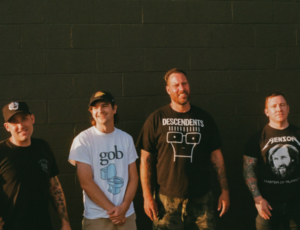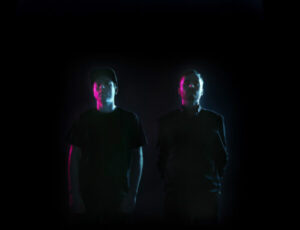
The late-’70s, early-’80s post-punk era was one of the most exciting times in pop music history, and absolutely pivotal in the area of alternative music in particular. The original punk rock scene had been absolutely incendiary… as well as volatile. Those with whom punk had resonated, and who felt the need to keep it alive, generally fell into two camps: the hardcore punk purists, and the reinventionist post-punks.
Although theirs was definitely a more post-punk mindset, Killing Joke had one of the most aggressive styles among their contemporaries: dark, sometimes throbbing electronica; dense, roaring guitars; a mercilessly tight, hard-hitting rhythm section; and tortured mad prophet vocals. Their intensely postmodern sound would influence further generations of alternative musicians, with bands as diverse as Nine Inch Nails, Porcupine Tree, Metallica, Tool, Justin Broadrick (Napalm Death/Godflesh/Jesu), and Rammstein citing them as influences.
In the 1990s, the Killing Joke sound took a turn towards the decidedly more metallic. Perhaps this is an example of where influence will feed back into itself. The styles are clearly distinguishable, but if you listen well, you can hear a lot of similarities between 1994’s
Pandemonium and what Godflesh and Nine Inch Nails were doing in the same year with
Selfless and
The Downward Spiral, respectively. Far from riding some wave that their successors had started or stubbornly doing what they had always done, Killing Joke showed humility and the ability to continue learning about music from those younger than them. This sort of industrial metal style, filtered through a veteran post-punk lens, continued to be the loose category for Killing Joke’s music throughout the 1990s and 2000s.
Now in 2012, they are releasing their fifteenth studio album to date, their second following the death of bassist Paul Raven. Named (in Roman numerals) for the year it was released,
MMXII very much follows the Killing Joke formula, which is, of course, a very free and counter-cultural one. For those familiar with Killing Joke’s discography, the sound of it is actually more like 1996’s
Democracy, rather than the stripped-down, guitar-driven rock of the 2003 self-titled album, or the raw, lo-fi industrial metal of 2006’s
Hosannas from the Basement of Hell.
According to official press releases,
MMXII’s inspiration and message is eschatological: calling for economic and environmental responsibility in the dawning of the Age of Aquarius. Visions and dreams of the end of time are not new to Killing Joke. Even one of their most well-known and accessible singles,
“Love Like Blood”, looks forward to some kind of restoration of humanity, coupled with destruction; rebirth through death, if you will.
Jaz Coleman’s throaty roar is different from that of virtually any other metal or hardcore screaming vocalist I have heard. I meant it when I described his as a “mad prophet” vocal style: his voice carries an otherworldly authority, yet as a human voice it is disturbed by reality. Since the ’80s, his voice has gotten harder, and at the same time the crossover point between his clean and dirty voices has changed, resulting in a more on/off dynamic rather than a gradual progression. It’s not a bad thing, in fact this tends to be what many modern metal bands shoot for. However, considering how skillfully Coleman had navigated that broader spectrum earlier in the band’s career, I can’t help feeling that something was lost there.
There is a compressed steadiness to the overall sound. This is actually a fairly consistent element of Killing Joke’s sound, especially in Geordie Walker’s guitar sound. The impact of it is really quite impressive: full, resonant, yet it sounds like it can rip your heart out; the instrumental twin of Coleman’s voice. Walker’s chord voicings and attack have a lot of conviction and consistency as well, so while there is not much intricacy to be heard, it is stated strongly enough to make you listen.
The negative side of this, though, is that the songs feature a lot of repetitions of rather simple musical ideas: riffs, rhythms, synth drones, melodies, etc. Killing Joke has used repetition rather intelligently in their past records, but this time around it does not sound as purposeful. The result is that the songs start out very strongly, but then wear out their nuance and novelty rather quickly.
At the same time, something I wished for in this record was a greater sense of musical cohesiveness from track to track. They are styled consistently, of course, but there is little to actually tie them together. If you heard them all performed live without knowing the band’s past releases, you would not be able to guess that they were all from the same record. The vision which inspired
MMXII seems to have played more of a role in the lyrical imagery than the music.
The best track on the album is probably the single,
“In Cythera”. Calling to memory the band’s earlier days and the sounds of some of their contemporaries such as New Order and The Cure, yet drawing appropriately from their more recent stylistic tendencies, it is a perfect marriage of yesterday and today.
Post-punk has played a vital role in the development of music as we know it today, and Killing Joke had no small part in that. With this release they have proven that they still have an overwhelming passion to create aggressive, evocative, and profoundly human alternative music. They continue to learn and experiment, which is highly commendable for a band which has been going for over three decades. For that matter, many bands stop learning before they hit three years.
So my hat is off to this absolutely legendary band for staying young, aging with humility, and keeping their hunger for good music and artistic wisdom. But I wouldn’t recommend
MMXII as a starting point if you’re interested in getting into them as a band. I would, however, encourage anyone who seeks to understand modern alternative rock to start somewhere in their catalogue: either of the self-titled releases (1980 or 2003), 1985’s
Night Time, or 1994’s
Pandemonium.
 The late-’70s, early-’80s post-punk era was one of the most exciting times in pop music history, and absolutely pivotal in the area of alternative music in particular. The original punk rock scene had been absolutely incendiary… as well as volatile. Those with whom punk had resonated, and who felt the need to keep it alive, generally fell into two camps: the hardcore punk purists, and the reinventionist post-punks.
Although theirs was definitely a more post-punk mindset, Killing Joke had one of the most aggressive styles among their contemporaries: dark, sometimes throbbing electronica; dense, roaring guitars; a mercilessly tight, hard-hitting rhythm section; and tortured mad prophet vocals. Their intensely postmodern sound would influence further generations of alternative musicians, with bands as diverse as Nine Inch Nails, Porcupine Tree, Metallica, Tool, Justin Broadrick (Napalm Death/Godflesh/Jesu), and Rammstein citing them as influences.
In the 1990s, the Killing Joke sound took a turn towards the decidedly more metallic. Perhaps this is an example of where influence will feed back into itself. The styles are clearly distinguishable, but if you listen well, you can hear a lot of similarities between 1994’s Pandemonium and what Godflesh and Nine Inch Nails were doing in the same year with Selfless and The Downward Spiral, respectively. Far from riding some wave that their successors had started or stubbornly doing what they had always done, Killing Joke showed humility and the ability to continue learning about music from those younger than them. This sort of industrial metal style, filtered through a veteran post-punk lens, continued to be the loose category for Killing Joke’s music throughout the 1990s and 2000s.
Now in 2012, they are releasing their fifteenth studio album to date, their second following the death of bassist Paul Raven. Named (in Roman numerals) for the year it was released, MMXII very much follows the Killing Joke formula, which is, of course, a very free and counter-cultural one. For those familiar with Killing Joke’s discography, the sound of it is actually more like 1996’s Democracy, rather than the stripped-down, guitar-driven rock of the 2003 self-titled album, or the raw, lo-fi industrial metal of 2006’s Hosannas from the Basement of Hell.
According to official press releases, MMXII’s inspiration and message is eschatological: calling for economic and environmental responsibility in the dawning of the Age of Aquarius. Visions and dreams of the end of time are not new to Killing Joke. Even one of their most well-known and accessible singles, “Love Like Blood”, looks forward to some kind of restoration of humanity, coupled with destruction; rebirth through death, if you will.
Jaz Coleman’s throaty roar is different from that of virtually any other metal or hardcore screaming vocalist I have heard. I meant it when I described his as a “mad prophet” vocal style: his voice carries an otherworldly authority, yet as a human voice it is disturbed by reality. Since the ’80s, his voice has gotten harder, and at the same time the crossover point between his clean and dirty voices has changed, resulting in a more on/off dynamic rather than a gradual progression. It’s not a bad thing, in fact this tends to be what many modern metal bands shoot for. However, considering how skillfully Coleman had navigated that broader spectrum earlier in the band’s career, I can’t help feeling that something was lost there.
There is a compressed steadiness to the overall sound. This is actually a fairly consistent element of Killing Joke’s sound, especially in Geordie Walker’s guitar sound. The impact of it is really quite impressive: full, resonant, yet it sounds like it can rip your heart out; the instrumental twin of Coleman’s voice. Walker’s chord voicings and attack have a lot of conviction and consistency as well, so while there is not much intricacy to be heard, it is stated strongly enough to make you listen.
The negative side of this, though, is that the songs feature a lot of repetitions of rather simple musical ideas: riffs, rhythms, synth drones, melodies, etc. Killing Joke has used repetition rather intelligently in their past records, but this time around it does not sound as purposeful. The result is that the songs start out very strongly, but then wear out their nuance and novelty rather quickly.
At the same time, something I wished for in this record was a greater sense of musical cohesiveness from track to track. They are styled consistently, of course, but there is little to actually tie them together. If you heard them all performed live without knowing the band’s past releases, you would not be able to guess that they were all from the same record. The vision which inspired MMXII seems to have played more of a role in the lyrical imagery than the music.
The best track on the album is probably the single, “In Cythera”. Calling to memory the band’s earlier days and the sounds of some of their contemporaries such as New Order and The Cure, yet drawing appropriately from their more recent stylistic tendencies, it is a perfect marriage of yesterday and today.
Post-punk has played a vital role in the development of music as we know it today, and Killing Joke had no small part in that. With this release they have proven that they still have an overwhelming passion to create aggressive, evocative, and profoundly human alternative music. They continue to learn and experiment, which is highly commendable for a band which has been going for over three decades. For that matter, many bands stop learning before they hit three years.
So my hat is off to this absolutely legendary band for staying young, aging with humility, and keeping their hunger for good music and artistic wisdom. But I wouldn’t recommend MMXII as a starting point if you’re interested in getting into them as a band. I would, however, encourage anyone who seeks to understand modern alternative rock to start somewhere in their catalogue: either of the self-titled releases (1980 or 2003), 1985’s Night Time, or 1994’s Pandemonium.
The late-’70s, early-’80s post-punk era was one of the most exciting times in pop music history, and absolutely pivotal in the area of alternative music in particular. The original punk rock scene had been absolutely incendiary… as well as volatile. Those with whom punk had resonated, and who felt the need to keep it alive, generally fell into two camps: the hardcore punk purists, and the reinventionist post-punks.
Although theirs was definitely a more post-punk mindset, Killing Joke had one of the most aggressive styles among their contemporaries: dark, sometimes throbbing electronica; dense, roaring guitars; a mercilessly tight, hard-hitting rhythm section; and tortured mad prophet vocals. Their intensely postmodern sound would influence further generations of alternative musicians, with bands as diverse as Nine Inch Nails, Porcupine Tree, Metallica, Tool, Justin Broadrick (Napalm Death/Godflesh/Jesu), and Rammstein citing them as influences.
In the 1990s, the Killing Joke sound took a turn towards the decidedly more metallic. Perhaps this is an example of where influence will feed back into itself. The styles are clearly distinguishable, but if you listen well, you can hear a lot of similarities between 1994’s Pandemonium and what Godflesh and Nine Inch Nails were doing in the same year with Selfless and The Downward Spiral, respectively. Far from riding some wave that their successors had started or stubbornly doing what they had always done, Killing Joke showed humility and the ability to continue learning about music from those younger than them. This sort of industrial metal style, filtered through a veteran post-punk lens, continued to be the loose category for Killing Joke’s music throughout the 1990s and 2000s.
Now in 2012, they are releasing their fifteenth studio album to date, their second following the death of bassist Paul Raven. Named (in Roman numerals) for the year it was released, MMXII very much follows the Killing Joke formula, which is, of course, a very free and counter-cultural one. For those familiar with Killing Joke’s discography, the sound of it is actually more like 1996’s Democracy, rather than the stripped-down, guitar-driven rock of the 2003 self-titled album, or the raw, lo-fi industrial metal of 2006’s Hosannas from the Basement of Hell.
According to official press releases, MMXII’s inspiration and message is eschatological: calling for economic and environmental responsibility in the dawning of the Age of Aquarius. Visions and dreams of the end of time are not new to Killing Joke. Even one of their most well-known and accessible singles, “Love Like Blood”, looks forward to some kind of restoration of humanity, coupled with destruction; rebirth through death, if you will.
Jaz Coleman’s throaty roar is different from that of virtually any other metal or hardcore screaming vocalist I have heard. I meant it when I described his as a “mad prophet” vocal style: his voice carries an otherworldly authority, yet as a human voice it is disturbed by reality. Since the ’80s, his voice has gotten harder, and at the same time the crossover point between his clean and dirty voices has changed, resulting in a more on/off dynamic rather than a gradual progression. It’s not a bad thing, in fact this tends to be what many modern metal bands shoot for. However, considering how skillfully Coleman had navigated that broader spectrum earlier in the band’s career, I can’t help feeling that something was lost there.
There is a compressed steadiness to the overall sound. This is actually a fairly consistent element of Killing Joke’s sound, especially in Geordie Walker’s guitar sound. The impact of it is really quite impressive: full, resonant, yet it sounds like it can rip your heart out; the instrumental twin of Coleman’s voice. Walker’s chord voicings and attack have a lot of conviction and consistency as well, so while there is not much intricacy to be heard, it is stated strongly enough to make you listen.
The negative side of this, though, is that the songs feature a lot of repetitions of rather simple musical ideas: riffs, rhythms, synth drones, melodies, etc. Killing Joke has used repetition rather intelligently in their past records, but this time around it does not sound as purposeful. The result is that the songs start out very strongly, but then wear out their nuance and novelty rather quickly.
At the same time, something I wished for in this record was a greater sense of musical cohesiveness from track to track. They are styled consistently, of course, but there is little to actually tie them together. If you heard them all performed live without knowing the band’s past releases, you would not be able to guess that they were all from the same record. The vision which inspired MMXII seems to have played more of a role in the lyrical imagery than the music.
The best track on the album is probably the single, “In Cythera”. Calling to memory the band’s earlier days and the sounds of some of their contemporaries such as New Order and The Cure, yet drawing appropriately from their more recent stylistic tendencies, it is a perfect marriage of yesterday and today.
Post-punk has played a vital role in the development of music as we know it today, and Killing Joke had no small part in that. With this release they have proven that they still have an overwhelming passion to create aggressive, evocative, and profoundly human alternative music. They continue to learn and experiment, which is highly commendable for a band which has been going for over three decades. For that matter, many bands stop learning before they hit three years.
So my hat is off to this absolutely legendary band for staying young, aging with humility, and keeping their hunger for good music and artistic wisdom. But I wouldn’t recommend MMXII as a starting point if you’re interested in getting into them as a band. I would, however, encourage anyone who seeks to understand modern alternative rock to start somewhere in their catalogue: either of the self-titled releases (1980 or 2003), 1985’s Night Time, or 1994’s Pandemonium. 









